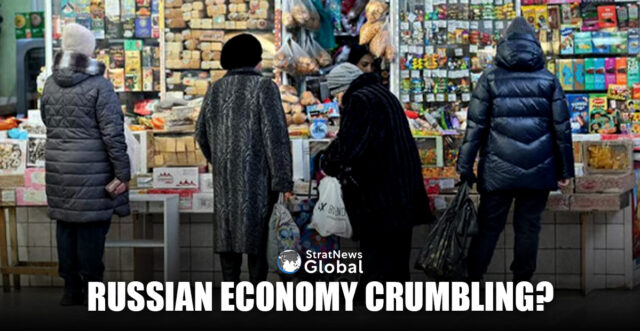As US President Donald Trump insists on ending the war in Ukraine warning to impose high tariffs and further sanctions on Russia, Vladimir Putin is a worried man.
Russian President Vladimir Putin has grown increasingly concerned about distortions in Russia’s wartime economy, Reuters sources said.
Russia’s economy, driven by exports of oil, gas and minerals, grew robustly over the past two years despite multiple rounds of Western sanctions imposed after its invasion of Ukraine in 2022.
But domestic activity has become strained in recent months by labour shortages and high interest rates introduced to tackle inflation, which has accelerated under record military spending.
That has contributed to the view within a section of the Russian elite that a negotiated settlement to the war is desirable, according to two of the sources familiar with thinking in the Kremlin.
Trump, who returned to office on Monday, has vowed to swiftly resolve the Ukraine conflict, Europe’s biggest since World War Two.
This week he has said more sanctions as well as tariffs on Russia are likely unless Putin negotiates.
Russia Under Pressure
“Russia, of course, is economically interested in negotiating a diplomatic end to the conflict,” Oleg Vyugin, former deputy chairman of the Central Bank of Russia said in an interview, citing the risk of growing economic distortions as Russia turbo-charges military and defence spending.
Kremlin spokesman Dmitry Peskov, when asked about the Reuters reporting, acknowledged “problematic factors” in the economy, but said it was developing at a high rate and was able to meet “all military requirements incrementally” as well as all welfare and social needs.
Just days before Trump’s inauguration, outgoing U.S. president Joe Biden’s administration imposed the broadest package of sanctions to so far target Russia’s oil and gas revenues, a move that Biden’s national security adviser, Jake Sullivan, said, would give Trump leverage in any talks by applying economic pressure on Russia.
Putin has said that Russia can fight on as long as it takes and that Moscow will never bow before another power over key national interests.
Russia’s $2.2 trillion economy had until recently shown remarkable endurance during the war.
‘War Goals Met’
Last year, Russia made its most significant territorial gains since the early days of the war and it now controls nearly a fifth of Ukraine.
Putin believes key war goals have already been met, including control of land that connects mainland Russia to Crimea, and weakening Ukraine’s military, said one of the sources familiar with thinking in the Kremlin.
The Russian president also recognizes the strain the war is putting on the economy, the source said, citing “really big problems” such as the impact of the high interest rate on non-military businesses and industry.
Russia has hiked defence spending to a post-Soviet high of 6.3% of GDP this year, accounting for a third of budget expenditure. The spending has been inflationary. Along with wartime labour shortages, it has driven wages higher.
On top of that, the government has sought higher tax revenues to reduce the fiscal deficit.
Putin’s Concern
Putin’s frustration was evident at a Kremlin meeting with business leaders the evening of Dec. 16, where he scolded top economic officials, according to two of the sources, who have knowledge of discussions about the economy in the Kremlin and government.
One of the sources, who was briefed after the meeting, was told Putin was visibly displeased after hearing private investment was being cut because of the cost of credit.
The Kremlin released Putin’s introductory comments praising business but did not identify any of the business participants at the mostly closed-door meeting. Reuters confirmed with one source that Central Bank Governor Elvira Nabiullina was not present.
(With inputs from Reuters)





